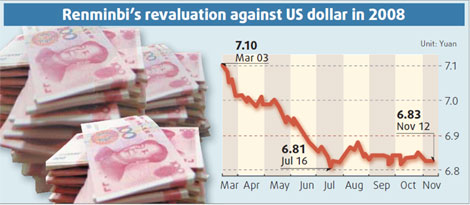The renminbi may continue to be flat despite the possible increased pressure on China to appreciate its currency faster ahead of Saturday's G20 summit in Washington, analysts said. It may even depreciate at certain points as the dollar strengthens and China's domestic economic outlook worsens.
They stressed that China's economic priorities mean that it cannot accept Western demands to speed up renminbi appreciation, as such a move would batter exporters who have already taken a beating from the global financial crisis.
The upcoming G20 financial summit, which will bring together the world's major developed and developing economies, is aimed at reforming the international financial regulatory system.
But it may also become a venue for some developed countries to put pressure on China to accelerate the appreciation of its currency in order to ease their economic problems, said Zhao Xijun, a finance professor at Renmin University of China. "China will surely face such a challenge."
In the long term, the renminbi has the potential to appreciate further, he said, given the fact that China's trade surplus remains large and will not be replaced by a deficit in the short term.
"As the global financial crisis hits, capital may flow into economies with relatively sound development prospects," Zhao said. "China is a favorable destination for capital flows, which will increase pressure on appreciation in the long run."
The Chinese economy, however, could no longer afford faster appreciation after the value of the nation's currency has risen by more than 20 percent against the dollar since July 2005, when the country scrapped the dollar peg and allowed it to fluctuate within a band.
The Chinese economy cooled off this year, with its GDP expanding 9 percent in the third quarter, nearly 3 percentage points lower than the whole of last year. The nation's trade surplus remained large by the end of September, but analysts said the expected sharp drop in foreign demand as a result of the global financial crisis and economic easing would cost Chinese traders dearly, leading to a narrowing trade surplus in the coming quarters.
Premier Wen Jiabao has said that this year is the worst for the country's economic development in recent years and vowed to take various measures to keep the economy from sliding further.
"The authorities would not like to see rapid renminbi appreciation," Zhao said. "They hope it could be 'basically stable'."
Faster appreciation of the renminbi at the moment will only harm the economy and not bring any benefits, said Liu Dongliang, a currency analyst at China Merchants Bank. "It is not only related to the bankruptcy of coastal exporters, it will cause serious unemployment and social instability," he said.
"I cannot rule out the possibility of small-margin depreciation in the renminbi over some periods of time next year if the economic situation worsens," he said.
Regarding claims from some US politicians that China should appreciate its currency faster, analysts said they have made such claims simply to win votes and their stance is not in the interests of the US.
US president-elect Barack Obama, for example, attacked China over the "manipulation" of its currency in a letter to the US National Council of Textile Organizations in late October.
Such claims are based on political rather than economic considerations, said Zhao from Renmin University of China.
"Rational US economists and politicians should know that a stronger renimbi would do the US harm and a weaker one would help them," said Xu Bin, an economist with Beijing-based Anbound Consulting.
A weaker Chinese currency will help reduce, through trade, inflationary pressure in the US, which has risen to around 6 percent, he said. "But US politicians have to cater to the interest of traders and call for greater appreciation."
The fundamental cause of the US crisis is a lack of confidence in its economy and the renminbi's appreciation would not help, said Zhao. "The renminbi has risen by more than 20 percent against the dollar since 2005, and has the US economy fared better?"

(China Daily November 13, 2008)